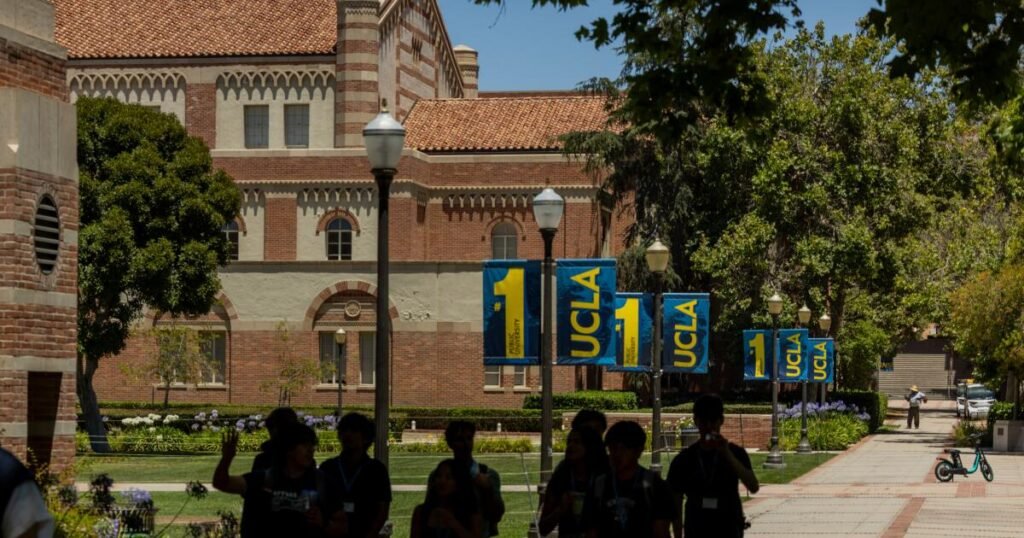UCLA Faces Major Funding Freeze from Trump Administration
The Trump administration has imposed a freeze on nearly $200 million in federal grants to UCLA, citing claims of “discrimination” within the university and a failure to ensure an environment free from anti-Semitism in research settings.
This funding withdrawal follows statements from Attorney General Pam Bondi and the Justice Department, asserting that UCLA will face significant consequences due to its “deliberate indifference” toward the civil rights of Jewish and Israeli individuals. These concerns were raised amidst campus protests supporting Hamas and annual demonstrations related to Gaza.
This marks the first significant instance of targeted funding retraction against UCLA under the current administration. Previously, the White House had directed its efforts mainly towards prestigious East Coast institutions, like Columbia, Brown, and the University of Pennsylvania, which have reached various agreements concerning issues around enrollment, Jewish student life, anti-Semitism training, and policies regarding gender identity in sports.
A letter addressed to UCLA Chancellor Julio Frenk from the National Science Foundation indicated the termination of grants due to ongoing allegations of racism and discrimination in admissions and other areas of student life.
Approximately 300 NSF grants, totaling around $180 million, have been cancelled, with about half of that amount already allocated. Researchers had anticipated the distribution of the remaining funds before the letter’s issuance on Thursday.
In a message to the university community, Frenk acknowledged that the terminated grants came from NSF, NIH, and other federal entities, without providing specific amounts from those agencies. A preliminary tally of the cancelled grants has reached around $200 million based on information from unofficial sources.
Frenk expressed sorrow over the government’s decision, emphasizing that the loss would be felt across the nation, impacting jobs, health, and the future reliant on research done at UCLA.
He mentioned in his statement, “The federal government argues that anti-Semitism and prejudice are the reasons for this action. However, penalizing essential research funding doesn’t effectively address or resolve claims of discrimination.”
There has been little response from spokesmen for the NSF and NIH regarding this matter.
The federal government’s approach of pulling funding from UCLA mirrors tactics seen in its dealings with Ivy League institutions.
This past spring, billions in federal grants to Harvard were cancelled, which subsequently resulted in a lawsuit aimed at reversing that decision and stopping further actions against international students. Harvard is currently in negotiations to resolve the legal disputes.
Columbia University recently decided to pay over $200 million to the federal government to settle investigations regarding alleged anti-Semitic incidents stemming from 2024 protests. Similarly, Brown University signed a $50 million agreement with the administration, directing funds to the Rhode Island Workforce Development Program.
This week, the Justice Department stated that UCLA was found to have violated the civil rights of Jewish and Israeli students and expressed a desire to negotiate terms to avert federal lawsuits.
A deadline was provided for UCLA to respond by Tuesday, with indications that, if no agreement is reached, legal action could commence by September 2nd.
It’s unclear how UCLA plans to respond. In a statement, the university emphasized its commitment to addressing these issues. Stet Holbrook, associate director of strategic communications, referenced a $6.45 million settlement reached with Jewish students who accused the institution of systemic discrimination.
Frenk took a firm stance in his letter, stating, “Federal research grants are not merely handouts. They represent essential funding for projects crucial to the health, safety, and economic future of our country.”
He added, “These grants can lead to breakthroughs in medicine, promote economic growth, enhance national security, and bolster our global competitiveness. We are currently assessing our best course of action and will maintain ongoing communication as we move forward.”







